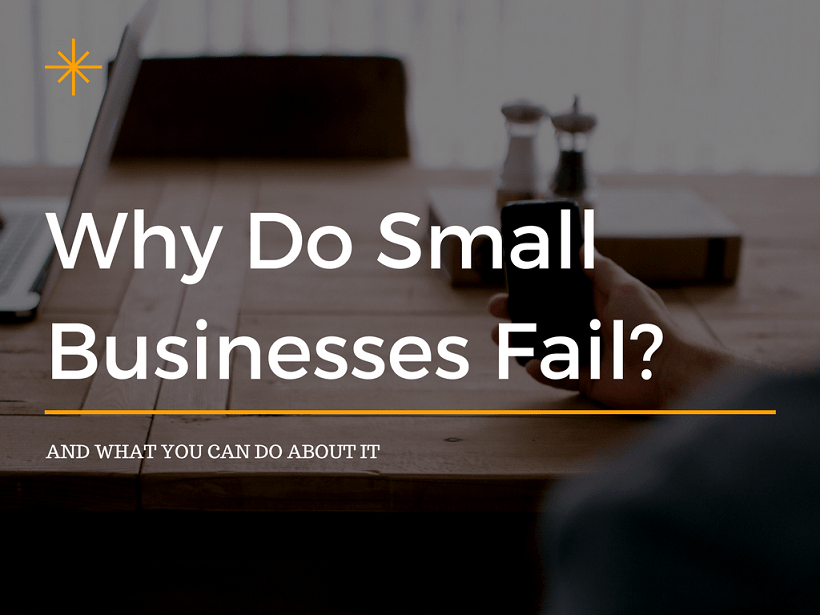Why Do Small Businesses Fail and What You Can Do About It?
 The truth about starting up a business is that odds are it will fail. Most small businesses fail within the first five years, but the good news is that many of the reasons why this happens actually can be avoided. The major small business failure reasons are foreseeable. So, what it takes from you is to do the proper planning and research to help avoid failure. To help you out here are five of the top reasons why small businesses fail and what you can do to prevent it from happening to your company.
The truth about starting up a business is that odds are it will fail. Most small businesses fail within the first five years, but the good news is that many of the reasons why this happens actually can be avoided. The major small business failure reasons are foreseeable. So, what it takes from you is to do the proper planning and research to help avoid failure. To help you out here are five of the top reasons why small businesses fail and what you can do to prevent it from happening to your company.
Not Enough Demand
There is simply not enough demand for the product or service you provide that will generate a profit for your efforts. This usually happens because the person starting the business does not adequately research the market to see if their product or service is needed. The adage, “you don’t sell a product, you find a product that sells” is never truer in this regard.
Solution: Do a thorough market research before you invest in your time and money. It is always better to spend a little bit more time and energy in advance, so you do not lose big afterwards. It is necessary to ensure that the product or service your business offers is in real demand. If not, find something else to sell otherwise you will most likely go out of business.
Too Much Growth
It may seem at first that growing too much is a problem you would like to have, but the truth is that many businesses fail when they expand far beyond their capacity to create a profit. They tend to move into markets that are not profitable, borrow too much money, or experience growing issues that damage their business brand.
Solution: Only grow your business as your profits expand, do not grow too much and too fast if this is unavoidable. For example, it is far better to pay your employees overtime wages at first and only hire when it becomes impossible to keep up with demand. Make sure that you have a plan to keep up with high demand when it happens.
Too Much Spending
Many businesses spend themselves into bankruptcy often without knowing it. This is because their operations are inefficient, or they’ve gone too deep into debt to get out even when the profits start rolling in.
Solution: Keep a sharp eye on every expenditure that you make. Do not dip into the till or pay for things you do not need. Keep your business funds and needs separate from your personal.
Bad Accounting Practices
Another common reason why businesses fail is that the owners do not fully grasp the money coming in and expenses going out. When you do not fully understand your accounting, you make assumptions that are not true which often leads to disaster.
Solution: As the owner, you need to be the chief financial officer to know exactly what is going on until your company is stable. So, do not hire someone else to run the finances until your business is on solid ground. Alternatively, you can hire someone as a consultant, but be sure to keep control over the finances and always have the broad picture of what is going on in your company when it comes to money.
Not Enough Cash
Growth is never at a steady pace. There will be times when it goes up quickly, levels off, and may even drop. If you have not built up enough cash to cover the rough patches, you will quickly go out of business.
Solution: Work on building up cash as a backup if your business growth should subside. That way, you can survive the rough patches that otherwise would bankrupt your company.
Final thoughts
The list provided above is not exhaustive, as small businesses keep failing for the wide set of reasons globally. What you can do to avoid this is to be as prepared as possible from the outset. Make sure that you always have a backup plan. It’s a smart thing to learn from other’s mistakes. So, most of the mistakes are known – try to learn and avoid repeating them to make your business a success. By following these guidelines, you can avoid the most common reasons why companies go out of business in their first years. A little planning can go a long way to keep you in business.

 Delicious
Delicious Digg
Digg StumbleUpon
StumbleUpon Propeller
Propeller Reddit
Reddit Magnoliacom
Magnoliacom Newsvine
Newsvine
Comments
Post new comment